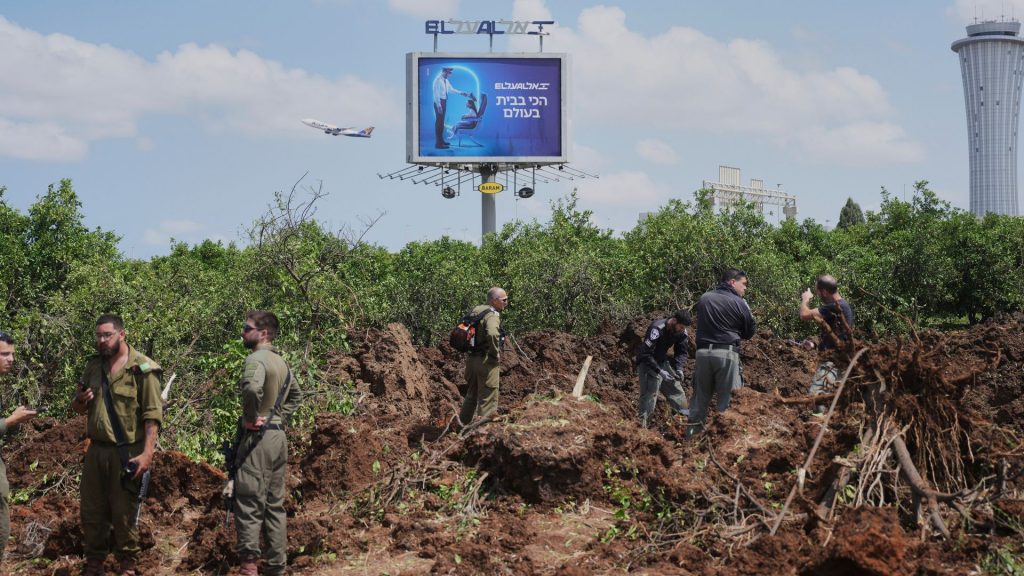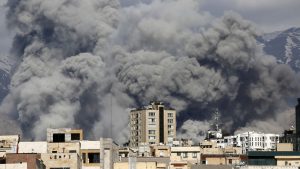Houthi missile strikes near Israel’s airport, briefly disrupting flights

Houthis in Yemen launched a hypersonic ballistic missile at Israel’s Ben-Gurion International Airport on Sunday, May 4, the group’s military spokesman Brig. Gen. Yahya Saree confirmed in a video statement. While the missile strike didn’t hit the airport itself, it did leave a sizable crater near an access road, temporarily disrupting flights and commuter traffic, the Associated Press reports.
Four people suffered minor injuries, according to Israel’s paramedic service.
Netanyahu responds
The attack occurred just hours before Israeli Cabinet ministers were due to meet for a vote on intensifying their war against Hamas in Gaza. While it’s unclear how the cabinet voted, Israel’s chief of staff, Lt. Gen. Eyal Zamir, has said that the army is calling up tens of thousands of reserves.
Meanwhile, in a post on X following the airport attack, Israeli Prime Minister Benjamin Netanyahu wrote, “Attacks by the Houthis emanate from Iran. Israel will respond to the Houthi attack against our main airport AND, at a time and place of our choosing, to their Iranian terror masters.”
The Houthis operate out of Yemen and are backed by Iran. They have repeatedly attacked Israel in solidarity with the Palestinian people. The U.S., meanwhile, has joined Israel in targeting Houthi leaders and outposts.
Given the strength and sophistication of Israel’s anti-missile defense system, known as the Iron Dome, it’s rare that the country is affected by airstrikes. The only other strike to hit Tel Aviv was a drone attack in July 2024, The Guardian reports. On Sunday, the military said a technical issue with the interceptor likely allowed the Houthi missile to hit airport grounds.
International flights into and out of Ben-Gurion International Airport had largely been paused since the start of the war. They were, however, more recently beginning to resume.
Israel to vote on intensifying war effort
Israel was due to meet Sunday and vote on whether to intensify the war against Hamas, which started on Oct. 7, 2023, after the Islamic militant group attacked Israel, killing 1,200 people and taking another 250 hostage. Rather than negotiate a new ceasefire agreement to replace the one that broke down in March, Israel seems intent on ramping up its pressure campaign on Hamas.
Israeli officials have said they want to take over more of Gaza, which can be used as leverage in future negotiations. Similarly, Israel’s far-right security minister, Itamar Ben-Gvir, is advocating for a “powerful” expansion of the war, which includes bombing Gaza’s “food and electricity supplies,” The Guardian notes.
“We need to increase the intensity and continue until we achieve total victory. We must win a total victory,” Ben-Gvir told Israeli Army Radio.
Israel’s war in Gaza has displaced more than 90% of its population and killed more than 52,000 Palestinians. Repeated blockades of humanitarian aid have led to serious condemnations from the United Nations. On Thursday, May 1, UN Emergency Relief Coordinator Tom Fletcher called the blockades a “cruel collective punishment” of the Palestinian population. Israel has claimed that Hamas uses the humanitarian aid to fund its military operations –– a charge Hamas routinely denies.
In early March, Israel blocked humanitarian aid entering Gaza and cut off its electricity supply.





